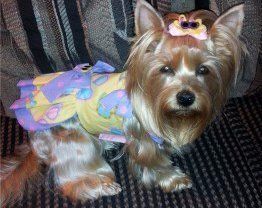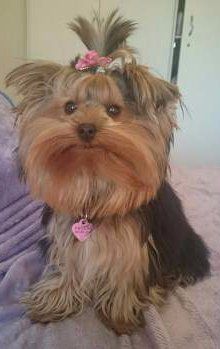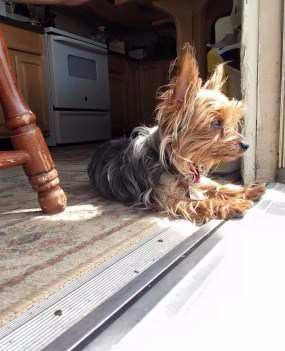Feeding Bones to a Yorkshire Terrier
Beef, Rib, Steak, Ham Bones, Raw and More
Overview
We've received a lot of questions asking if it is safe for a Yorkshire Terrier to eat bones; everything from spare rib bones left over from Chinese food to steak or even large ham bones.
There's usually one of two things happening when owners ask this. The first seems to be the most common; friends are over for a barbecue and someone thinks that they're winning favor from your Yorkie by giving them a bone and you only find out after the deed is done.
The other is if you are enjoying a nice dinner and you wonder if it would be okay to let your Yorkie chew on a bone.
Please note:
YorkieInfoCenter is reader-supported, and some of the product suggestions on this page are affiliate links. As an Amazon Associate we earn from qualifying purchases. This is at no extra cost to you and helps us continue providing free, high-quality information.
After all, isn't this what dogs have always done? And isn't this a favorite snack
for dogs? What did people give to dogs for treats before commercial treats were readily available?
In this section we are going to discuss:
- Why some bones are safe and others are not
- Are these really full of nutrition?
- Do these really help with keeping teeth clean?
- Exactly which bones are safe for a Yorkshire Terrier to eat and where to find them
- Which types are very dangerous
- What can happen if a Yorkie chews and/or ingests certain bones
- Details on if a Yorkshire Terrier can safely eat the raw meat on bones
- Steps to take if your puppy or dog has partially or fully ingested a bone
- Some good alternatives to satisfy the cravings for chewing
Ginger Meadow, 6 years old
Photo courtesy of Connie Scott (Los Angeles)
Why Some Bones are Somewhat Safe and Others are More Dangerous
There are two main elements that distinguish bones to be safe or not:
#1
The most dangerous element regarding a dog eating meat bones is the structure of the bone. When raw, many bones are flexible and may or may not splinter off as they are chewed. However, when a bone of just about any kind (fish, chicken, beef, turkey, etc.) is cooked the calcium deposits from within the marrow evaporate along with moisture.
This makes a bone very brittle; if a puppy or dog were to chew it, it could cause damage to the mouth, esophagus, stomach, intestines and even rectal area. Essentially, it can cut and cause injury during the entire trip from the mouth to when it is expelled.
#2
Size is another large factor. The smaller the bone -even if it is raw and flexible- can lead to swallowing of it in its entirety which is a major choking hazard.
While chicken bones may automatically come to mind, this also includes small baby back rib bones which can be tiny enough to be swallowed with very little chewing involved. Those that are too large can break a tiny dog's teeth.
Are Bones Nutritious?
There's a lot of misconception regarding the nutritional value of meat bones and whether or not these are healthy for a dog.
There are essentially 2 parts to a bone: the actual bone and the marrow contained within it. You may be surprised to learn that 70% of just the bone itself is comprised of inorganic substances. The majority of a bone is a substance called hydroxyapatite, which contains 4 elements: calcium, Phosphorus, Oxygen and Hydrogen. Within this 70%, there are zero vitamins, protein, fatty acids or any other nutritional ingredients.
The remaining 30% is made of organic material. Almost all of this 30% ratio (about 95% of it) is made out of collagen, which is a fibrous protein that dogs do not digest very well. It is not absorbed by the body and usually passes through the dog's digestive system similar to the way that fillers in commercial dog food pass through without offering anything.
The rest (5% of that 30%) is made of Chondroitin Sulfate, Keratin sulfate, and Phospholipids.
The only two elements that have some nutritional benefits are the calcium and phosphorus. It should be noted that a high consumption of bone can cause constipation issues or very hard dry stools. The color of a Yorkie's stools will change if the dog eats a lot of this; there is often a gray color to the feces and if there are no constipation
problems, this is considered to be normal.
In regard to the marrow, this is found in varying levels depending on the bone. When a dog goes at a bone, chewing and gnawing, it is usually because he is after the marrow. It contains mostly monounsaturated fat and high levels of protein.
Most dogs find the marrow from bones to be very delicious; there are some people who eat this (mostly those on a Primal diet) and it is said to have a creamy texture and a subtle nutty flavor with a touch of sweet.
It is important to note that too much marrow can cause loose stools or diarrhea and this is another factor that must be considered since diarrhea is rather dangerous for toy sized
dogs like the Yorkshire Terrier that can quickly become dehydrated.
While this part of a bone can offer some benefits to a Yorkie, it is certainly not the only way to obtain it.
Are Bones Good for a Yorkie's Teeth?
It is true that all of the chewing and gnawing that must be done for a dog to reach the marrow of bone or to pick off tiny pieces of meat that are stuck to a bone really do give the teeth a good workout. It can also help a dog's jaw stay strong.
The flip side to this is that bones can be very hard (even raw ones) and a puppy or dog can actually break a tooth on a bone; this typically happens because the dog will really bite down with zest due to the tempting
smell and promising reward.
When a dog gets carried away it is not that uncommon for this to lead to a chipped or cracked tooth. This is a real risk that owners need to be aware of and is much more prevalent with toy breeds like the Yorkie since they have very small mouths and most safe bones are rather large.
We must keep in mind that with quality dental chews and proper toys, keeping teeth clean and the jaw muscles strong can easily be accomplished without giving a Yorkshire Terrier any bones.
Can Dogs Safely Eat Raw Meat on Bones?
In general, the answer is yes, though there are always exceptions.
Anatomically speaking, our cute little canine family members of today have an almost identical gastrointestinal tract as wolves. Most Yorkies can technically handle raw foods. The bacteria that can be found on raw bones including salmonella and E.coli are usually not a concern for canines.
With this said, there are always exceptions. Any bones given should be fresh and refrigerated. In addition, you'll want to keep in mind that any sudden changes to a Yorkie's diet can cause stomach distress.
If a Yorkshire Terrier were to suddenly be given a good amount of raw food or hypothetically be given a large number of bones, this could cause upset stomach including diarrhea simply due to a fast change in the diet.
Phoebe; Photo courtesy of Tereza dos Santos
Why Cooked Bones (and even some raw ones) are So Bad for Dogs
You will never want to purposefully give your Yorkie a cooked bone of any kind.
There may be an instance where a Yorkshire Terrier grabs and eats a cooked bone and we will go over what to do and how to react coming up.
When a bone is cooked (and it does not matter whether it was baked, boiled or barbecued), the marrow and moisture inside evaporates, which leaves a very brittle shell that easily breaks into tiny splinters.
These bone fragments can cause damage to just about any part of a dog's body beginning in the mouth and ending…well, where things end when the puppy or dog goes to the bathroom.
This includes:
Teeth
- As soon as a Yorkie bites down, a tooth can crack or chip. While any tooth at all can be broken, it happens most often to the premolars.
In some cases, this is not noticed right away by an owner and it can lead to root infections and abscesses. These can be quite painful and even lead to infection spreading throughout the body to all major organs. .
Small fragments can also become wedged between teeth which can be quite painful.
Tongue & mouth
- Sharp splinters can poke through the tongue and any soft tissue in the mouth. They may become stuck or may slice the tissue.
Esophagus -Little pieces of bone can be a dangerous choking hazard or can cut into tissue as it travels to the stomach.
Windpipe
- It's not uncommon for a puppy
or dog to become so excited when eating a bone that he accidentally inhales and it is drawn into the windpipe which is an emergency issue.
Stomach
- Even if the bone was swallowed without issue, once in the stomach, the shape of it can make it impossible to pass through into the intestines. Another risk is that sharp pieces of bone can poke a hole in the stomach lining which can lead to Peritonitis which is an inflammation of the lining of the stomach. This is a life-threatening condition; even with treatment it is fatal in 10% of the cases when caused by injury (mortality rates are 40% when caused by infection).
Intestines
- Splinters can cause dangerous partial or full blockage, which usually requires emergency surgery.
Rectum
- Even if a Yorkie were to eat a cooked bone and not have injury to the teeth, mouth, esophagus, stomach or intestines, bones are not digested and as it moves it way out of the body during a bowel movement, it can cut and slice tender tissue around the anus.
Bones that are Somewhat Safe for a Yorkie to Eat
We feel that due to the many factors of:
- Relatively speaking, they are not all that nutritious.
- Chewing urges can be satisfy via the right toys.
- Teeth can be kept clean via scrubbings at home with a quality paste & brush, with quality dental treats and with routine professional cleanings.
- Even bones deemed safe can pose risks such as cracked teeth since a Yorkie has a very small mouth, tiny teeth and the majority of safe bones are large and too strong for a toy breed to handle.
- Those that are 'okayed' for canines, even if given raw, have the potential to splinter.
- If a lot of bones are given and those have raw meat on them, there is a chance this can cause stomach issues.
- Too much marrow can cause diarrhea
or loose stools.
- Too much bone can cause constipation or very hard dried stools.
…that there is no reason to purposefully give real meat bones to a Yorkshire Terrier.
Now with that said, you may have found that your Yorkie really enjoys eating a bone and you'd like to continue offering this as a special treat now and then or in the case of someone giving your dog a bone without your knowledge, we will discuss which ones are safe and which are not.
Ground bones
- If a Yorkie were to purposely be given bones, this is really the only 100% safe method to do so. Even chicken bones can technically be given to a dog if they are ground to a very fine texture. Those that come from chicken and turkey are hollow and are usually the best for grinding. This is often done by owners who feed their dogs a BARF (Bone and Raw Food) diet. Little thin bones like this are often ground with a heavy-duty meat grinder.
Veal bones
- These tend to splinter less than those from many other meats; if you really want to give your Yorkshire Terrier a bone (though we do not recommend it), a veal bone would be one of the better choices.
Raw knuckle bones
- Out of all of the options that a dog could be fed, this is considered one of the safer ones. At a butcher's shop, these are often labeled to be soup bones. These should be frozen and thawed one at a time.
Bones that are Not Safe for a Yorkshire Terrier
Marrow bone rings - These are not safe due to possibly catching on teeth or becoming lodged in the roof of the mouth. These also contain large amounts of marrow which can cause diarrhea.
Chicken or turkey bones
- Even if raw, these are not safe due to the size. The risk of blockage is too great.
Ham bones
- These are found in the center of hams and for this reason they are not easily accessible until the ham is cooked and eaten. For this reason, when owners ask if a Yorkie can eat a ham bone, they are almost always referring to a cooked ham bone which is makes it exceedingly unsafe.
Beef or bison femur or hip bones- These are usually given to medium to large dog breeds and even so these are usually very hard which can cause damage to the teeth.
Baby back rib bones
- This is the one that we receive the most questions about; perhaps it's because so many owners barbecue ribs and want to be able to give their Yorkie a treat as well. While the meat from these can be given in moderation (just be careful about which sauces may be on the meat since many can contain onion), baby back rib bones can splinter even when raw and should be avoided.
Spare rib bones
- These are thinner than leg or knuckle bones and for this reason even raw ones can splinter more easily. However, most owners ask this in regard to when they have gotten an order of Chinese food and want to know if it's okay to offer a spare rib to their Yorkie. While a small piece of spare rib meat can be given to a Yorkie, do be careful since Chinese food tends to have very high levels of sodium and also may be flavored with onion which is toxic to canines.
What to Do if Your Yorkie Eats a Bone by Accident
There are endless scenarios for how a Yorkshire Terrier of any age can end up eating a bone… He may grab food from a coffee table, get into a bag of leftovers from an order of chicken wings or even be fed a bone by a misguided friend who thought that she was giving your dog a safe tasty treat.
There are several steps that you should take:
1) Immediately check your Yorkie's mouth for any damage.
You'll want to use a flashlight to check the teeth, look for any bone fragments that may be stuck between teeth and look for any signs of injury to the inside of the mouth and tongue. If you are not sure if a tooth is cracked, it is best to have the veterinarian do an examination.
Keep an eye out for signs of tooth pain which includes reluctance to eat and/or chew on toys. Since a cracked tooth can lead to infection and that can take weeks or months to develop or to manifest as pain, you'll want to keep up with regular vet visits and report any signs of oral pain.
2) Do not try to induce vomiting.
Terrible damage can occur if the bone is forced to come back up through the throat.
3) Feed your Yorkie as much rice and bread as he will eat; this can sometimes work as a cushion and it is much better if there is food in the stomach as opposed to just the bone. Both rice and pieces of bread can be drizzled with low-salt chicken or beef broth to make them more enticing.
4) It can take several days for it to pass through the body, so you will want to closely monitor your Yorkie for at least 3 days. You will be looking for any signs of blockage or internal injury. This includes but is not limited to fever, listlessness, whining, reluctance to exercise, straining when going to the bathroom, vomiting (food, yellow stomach bile or a clear white fluid), extended stomach, obvious signs of pain.
If any of these symptoms are evident, bring your Yorkie to the vet immediately and let him know which type of bone was ingested and when.
5) Keep checking the stool
to look for fragments that may be expelled. Also, inspect your Yorkie's rear end after each bowel movement to see if there is any evidence of blood. If so, contact your vet ASAP.
Better Alternatives
While rawhides used to be a common substitute for bones, it is now known that these are exceedingly dangerous to the risk of blockage; these are made from indigestible materials and many had/have toxic chemicals.
The goal is to offer a treat that is hard enough to promote healthy gums and teeth, gives the jaw a healthy workout without overtaxing the jaw muscles, actually offers good nourishment, satisfies a Yorkie's urge to chew…
And does all of this without causing possible tooth injury, loose stools, upset stomach or risk of obstruction.
Look for chews that are made with real wholesome ingredients such as chicken, lean beef, sweet potatoes and/or other vegetables. You'll want them to be low in fat and be enriched with vitamin and minerals.
Be sure to choose snacks that are sized for toy breed dogs like the tiny Yorkshire Terrier. Good chews will be large enough that a puppy or dog can work on them for quite a while, similar to a bone but much safer.
Chloe Ferrer, photo courtesy of Leida
Summary
It is very risky to give any type of bone to a Yorkie or other small dog. The benefits do not outweigh the risks.
If your Yorkshire Terrier has been eating bones for a while without any problems, it may just be a matter of being lucky so far…and you know what they say about luck running out. Please play it safe by offering healthy alternatives.
If your Yorkie accidentally eats a bone, closely watch your puppy or dog for any signs of troubles for several days until you know that there is not an obstruction and that the bones have passed through the body.
Things to Do Now:
Become a Member
(if you are not already a Member) -Receive reminders when we add new pages and you
can suggest a topic for us to write about. We always look to Member suggestions. You will also receive a free, helpful Welcome Booklet.
Browse Yorkshire Terrier Supplies, for all of our top recommended items to ensure optimal care.
Check out our book
- Simply the most comprehensive, helpful Yorkshire Terrier book that exists - in both Print & eBook.
Popular Pages
Yorkie has a Bad Smell
- Reasons why a Yorkshire Terrie may start to have an odd odor. Covers odors coming from certain body parts and also all-over smells.
Snacks for a Yorkie
- Choosing great snacks is just as important as what you offer for main meals.


-263x243.dm.edit_P809uC-1920w.jpg)



